Peter MALONE
Saturday, 18 September 2021 19:43
Sea Hawk, The
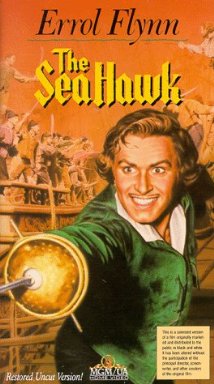
THE SEA HAWK
US, 1940, 127 minutes, Black and white.
Errol Flynn, Brenda Marshall, Claude Rains, Flora Robson, Donald Crisp, Alan Hale, Gilbert Roland, Henry Daniell. Una O’Connor?, William Lundigan.
Directed by Michael Curtiz.
A Warner Bros. production of 1940. By this stage Michael Curtiz had directed Errol Plynn in many epic adventurse including Captain Blood, Charge of the Light Brigade. This is superb Errol Flynn heroic material. Claude Rains appears yet again as a villain. Flora Robson gives a vigorous performance as Queen Elizabeth. There is spectacular setting, good naval material, excellent black and white photography, an excellent Korngold score. This is rousing matinee material showing the quality of film-making in Hollywood of the thirties and forties.
1. Impact, enjoyment?
2. The style of the film: Warner Bros. production of the thirties, black and white photography, re-creation of acts, crowds, costumes? Musical score and its rousing nature, songs? The presentation of courtly pageant? Adventure?
3. The quality of the Elizabethen settings, Spain in the 16th century? Visual impressions, the court, ambassadors, the sea?
4. Audience presupposition about Spanish and English conflict in the 16th century? Elizabeth and her aims for England? The Spaniards presented as villains?
5. The atmosphere of the sea: the initial presentation of the ships and the attention to detail, the frequent tracking shots to give the scope of the ships, the battles? The presentation of the sea battles in their detail? The presentation of history as it was? Enhanced by heroic story telling?
6. Errol Flynn’s style as Captain Thorpe? His role as an English pirate, his working for England. for the Queen? His skill in taking ships, releasing prisoners etc.? A patriot? His place with the other captains? The attitude of the Queen, his presence in court? His attitude towards the Spaniards, Don Alvarez? The Mexico project, its details, failure, slavery, escape? His participation in final battles? Diplomacy at Elizabeth's court? Getting finally to the Queen and her approval? The romantic side of his nature and his love for Maria?
7. The portrayal of the crow, the varying personalities, their role on the ships, obedience to Captain Thorpe, heroism?
8. Claude Rains as Don Alvarez? Spaniard,villain? Political attitudes, the British court, diplomacy? His hold over Maria and her final staying behind?
9. Flora Robson's portrayal of Queen Elizabeth? Her influence in England, her attitude towards her courtiers, her strategies, attitudes to Spain? Her enjoyment of Thorpe’s company and her trust in him? Her backing of his American plan?
10. The personalities of the various courtiers and the intrigue at the Elizabethen court?
11. The detailed portrayal of heroism, sword fighting, romance?
12. The values behind this kind of production? Traditional attitudes towards good and evil, right and wrong, heroes and heroines?
Published in Movie Reviews
Published in
Movie Reviews
Tagged under
Saturday, 18 September 2021 19:43
Sea Devils
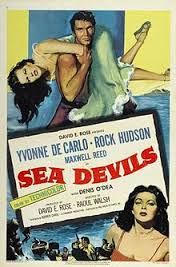
SEA DEVILS
US, 1953, 91 minutes, Colour.
Yvonne De Carlo, Rock Hudson, Maxwell Reed, Dennis O’ Dea, Michael Goodliffe, Bryan Forbes, Ivor Barnard, Gerard Oury.
Directed by Raoul Walsh.
Sea Devils is a minor Raoul Walsh adventure. Walsh made a number of films from the early decades of the 20th century and achieved more status in the 1930s with The Big Trail. He made a number of action adventures at Warner Bros in the late 30s and early 1940s including High Sierra. He had a long career, generally making action films as well as action dramas.
Rock Hudson is the star, he was up-and-coming at this period. He is supported by a British cast including Bryan Forbes who was to be better known as a director (The Whisperers, Whistle Down the Wind, The Wrong Box). The leading lady is Yvonne De Carlo – a spy in Napoleonic times who has to get from the Isle of Guernsey, where Rock Hudson is a fisherman-turned-smuggler, to the French coast. French director Gerard Oury appears as Napoleon.
1. Was this a good adventure spectacle? What appeals to audiences in adventure spectacles? Historical spectacles?
2. The significance of the title for the film? The use of adventure conventions, navy conventions, spying, the Napoleonic Wars? how well were these conventions used?
3. Comment on the British atmosphere of the film? The Channel isles, Britain and France during the wars? The use of colour, locations, music?
4. The importance of the stars for the film? Glamour and heroics? How convincing?
5. How authentic did the settings seem to be? The use of the sea, smugglers and fishermen, ships, government of the Channel islands, spies? Why do these ingredients attract audiences?
6. Comment on the patriotism portrayed in the film: Napoleon, his dreams of Empire, his ministers and police? The British and their patriotism? The use of spies?
7. How convincing and interesting a hero was Gilbert? His heroics, patriotism, love, capacity for fighting and action?
8. How attractive was the heroine? Convincing as a spy? The importance of her being abducted, reinstated. trying to persuade Napoleon and the police, being rescued?
9. The portrayal of the British in Guernsey island? The sailors?
10. The portrayal of the Prince, Napoleon, the police, the torturing, the innkeeper?
11.What were the highlights of the adventures in this film?
12.Was it a good example of action spectacular?
Published in Movie Reviews
Published in
Movie Reviews
Tagged under
Saturday, 18 September 2021 19:43
Sara T: Portrait of an Alcoholic
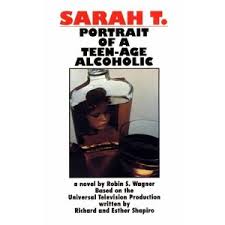
SARA T. - PORTRAIT OF AN ALCOHOLIC
US, 1975, 100 minutes, Colour.
Linda Blair, Verna Bloom, William Daniels, Larry Hagman, Michael Lerner, Mark Hamill.
Directed by Richard Donner.
A very effective and strong telemovie. Taking very real problems of adolescent alcoholism, the film shows us the effect on the adolescents themselves, on the parents, on the tragic consequences of violence, rejection and so on.
Directed effectively by Richard Donner (he was then to make The Omen and Superman) it stars Linda Blair who is much more effective than in many of her film roles. It is interesting to note that her sympathetic boyfriend is played by Mark Hamill who was to go on to Star Wars. Verna Bloom is very effective as Sarah's harsh mother. There are many good sequences and the film could be and should be effective disturbing television watching.
1. The use of television for presenting such themes and issues? The story impact, the visual impact of a teenage alcoholic girl? What is the effect on the home audience? The moralising effect and didactic effect?
2. The telemovie's qualities for communicating these themes in the home itselft the use of the stars, the middle-class and glossy setting, the staging of particular sequences with which audiences could identify?
3. How credible were the characters, the plot and the issues? As representing the seventies? The social situations and problems? What critique did the film make? What solution did it offer?
4. The tone of the credits with the cross between the commercials and the monochrome grim scenes and statistics? How did this lead into audience awareness of Sarah, the topic itself?
5. What made Sarah drink at such an age? The home environment, her parents, her relationship with friends and peers, her understanding of herself and dissatisfaction? Her self-image and a pessimistic outlook? How were each of these aspects illustrated? Fairly? The blending of all these
factors?
6. The importance of Sarah's age? Her father leaving? The divorce, her mother having custody, her stepfather? Her relationship with her sister? The need for parental love and care? The atmosphere of wealth, her family's parties and the people there, for example Mr Peterson? Her mother and Mr Peterson arranging dates? Nancy and her reaction to her parents, especially her absent father? Ken and his offhandedness but growing to like her? School, failure to get into the Glee Club? The fights at home? Her mother accusing her of embarrassing her so often? The punishments meted out by Matt?
7. Comment on Sarah's good qualities and strengths as presented: her brightness, intellect, her capacity for singing especially at the party, relationship to Ken, the horse-riding etc.
8. The character of Sarah's father with his dreams? Her anxious ringing him so often and hoping that the phone would ring and that he had to be there? What impact did his presence make? Wandering and talking the city? Giving her so much money? His absence and hopes for jobs? Drinking? His agree
ment to participate in the therapy and his angers, especially with his wife? His walking out and seeming refusal to have Sarah! The ending and his asking her to forget everything and come with him? What help did he offer his daughtr? What could he have done?
9. The contrast with Joanne, her attitude towards her daughter and Sarah not thinking that her mother loved her? Her remarriage? Relationship with Matt? The stress of Sarah embarrassing her? Her whole set of values in terms of time, wealth, prestige and position, jobs? Expectations of her daughter? Pushing her especially into the date with Ken and then the violent reaction when she came home drunk? Her own drinking habits? Her attitude towards the maid and dismissing her?
10. The character of Matt, his presence in the house, relationship with Joanne, reinforcing her values, his attitude towards Sarah, her punishment? His not participating in the therapy? Joanne's anxiety and the therapist?
11. The role of Nancy and the elder sister and not being a support and telling her parents about Barah?
12. Ken as a character, nice boy, the group with which he moved, his horseriding? The bonds between them, tentative at school, sexuality? The study ng night and their clash? His asking her to go to Alcoholics Anonymous for his sake? His love for Daisy and the impact of the death of the horse? His turning away from Sarah? would he forgive her?
13. The atmosphere of the party and Sarah taking drinks? The drinking in the closet, pretending her mother was in the shower and getting the drink from the cellars? The maid? The repercussions of her drinking and hurting others? At school? The school councillor and her reaction?
14. The wisdom of what the school counsellor said and Joanne's reaction and violence? The doctor and both Sarah's and her mother's resistance to him? His telling her the truth, his handling of the situation and his method of therapy? The importance of confrontation? The importance of the sequence where the family therapy went on and the violent anger of the reactions? The husband and wife getting out their hostilities? The, truth told? The impact on Sarah herself and her trying to express her feelings and hopes about each of them? The nature of her resistance to saying that she was an alcoholic?
15. The A.A. meeting and the people there, their friendliness, the testimonies? The eleven year old boy and his story? The girl trying to help Sarah and parallel her own situation? Sarah's brazenness in taking the drink, the effect of the boy's talk and her running away? Her choice at the end with their presence in the hospital?
16. What convinced Sarah at the end that she was able to say she was an alcoholic? Her parents trying to play it down? The doctor and his response? Her angry sequence when she smashed everything and talked about the people that she hurt, specially Ken and the horse? (The importance for the audience of the death of the horse and the emotive response to understanding what was happening to her?) The values that the film stood by and their impact for a modern audience? at home?
Published in Movie Reviews
Published in
Movie Reviews
Tagged under
Saturday, 18 September 2021 19:43
Sea Chase, The
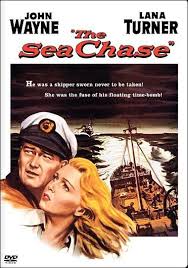
THE SEA CHASE
US, 1955, 117 minutes, Colour.
John Wayne, Lana Turner, David Farrar, Lyle Bettger, Tab Hunter, James Arness, Richard Davalos, John Qualen, Paul Fix, Lowell Gilmore, Alan Hale Jr.
Directed by John Farrow.
The Sea Chase is an entertaining action adventure. It is a variation for John Wayne, whom audiences are so used to in westerns. It was made after Hondo and before The Searchers.
Wayne this time is a German freighter captain. Not sympathetic to the Nazis, he decides to head with his crew to Norway. He also has an attractive spy on board. In the meantime, the British are in pursuit, led by David Farrar. The film also has a number of young actors of the period on board, especially Tab Hunter and Richard Davalos as well as James Arness.
The film is expected action adventure. It was directed by John Farrow who made many action films but was also interested in the sea with such films as Two Years Before the Mast as well as John Paul Jones.
1. How enjoyable an adventure was this? what characteristics did it use? How well? Audience involvement and response?
2. How interesting was the film as a war film? Particularly with its German point of view? Audience response to this?
3. How enjoyable was the film as a navy and sea adventure? The characteristics of the chase? the storms, fuelling, crew relationships?
4. How good was the structure of the film? The English commander's reminiscences and commentary? His change of attitude during this commentary? Allowing for mystery at the end? Was this structure better than straightforward narrative or not?
5. The German captain: how central was he in the film? His relationship to the ship and its background? His own background as anti-Nazi? The fact of being caught in Sydney at the beginning of the war? The importance of his decisions? His loyalty to Germany? His integrity and pride, the driving force for achievement? His capacity for hardness, for suffering, for compassion? The quality of his ingenuity? Of his love for Elsa? What kind of man was he? How heroic? The significance of John Wayne playing this part?
6. How did the film highlight the significance of his achievement? The South American sequences? The ending of the film and the British commenting on his achievement? Human endurance and loyalty?
7. How interesting was the contrast of the Germans with the British? Comment on the motivations of the British? The war motivations, the personal motivations of the captain, the emotional motivations? How well illustrated and employed were they during the film?
8. The character of Elsa? The fact that Lana Turner played the role? First impressions? The truth about her as a spy? Her capacity for heroism alongside the captain? Her decision to stay with hin? The quality of her love? Her remaining with him at the end and his saving her? The fact that if she died with him she had achieved something?
9. How well did the film communicate the different personalities of the different men in the crew? The villain and his cruelty? The Nazi type? Th captain submitting him to his death?
10. The other members of the crew, the strong man, the old man on the look-out, the young sailors, the sailor mauled by the shark and shooting himself? From ordinary sailors on a small ship, what heroism did they achieve?
11. The importance of the sequences of refuelling at the Island, the getting of fuel, the captain's way of forcing the men to work, his use of psychology on them? This intercutting with the British pursuit?
12. The South American sequences, the heroism, ontrasting with German propaganda and the Nazis, the captain’s undergoing humiliation in public?
13. How interesting was the presentation and the using of such incidents in German and British propaganda?
14. How deep was the film mant to be? How much merely an adventure? successful on each of these levels?
Published in Movie Reviews
Published in
Movie Reviews
Tagged under
Saturday, 18 September 2021 19:43
Scrooge
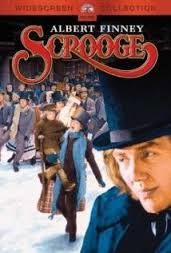
SCROOGE
UK, 1970, 113 minutes, Colour.
Albert Finney, Alec Guinness, Edith Evans, Kenneth More, Michael Medwin, Laurence Naismith, Anton Rodgers, Kay Walsh.
Directed by Ronald Neame.
Scrooge is a musical based on Charles Dickens’ very popular novel A Christmas Carol. The writer of the score was Leslie Bricusse, best known for his work on Doctor Doolittle, Stop the World, I Want To Get Off.
Scrooge has been portrayed by many actors on screen including Alastair Sim and George C. Scott. Michael Caine portrayed him along with the Muppets in The Muppets’ Christmas Carol.
This time Scrooge is portrayed very effectively by Albert Finney. Alec Guinness is Jacob Marley’s ghost, Edith Evans the Ghost of Christmas Past, Kenneth More the Ghost of Christmas Present. Michael Medwin is Scrooge’s nephew Fred.
The film has all the ingredients from Dickens’ novel, the meanness of Scrooge, the celebration of Christmas, the tormenting of Scrooge, the Cratchits and Tiny Tim. The film did not make such an impact, nor the music. However, it is an enjoyable pastime, variation on Dickens.
The film was directed by Ronald Neame, the English cinematographer and editor who worked for David Lean, went to Hollywood and directed such films as The Poseidon Adventure and The Odessa File.
1. Was this an enjoyable film? Why? Critics did not praise it. Did you think it was a success? Why?
2. How interesting a picture of London in the 19th century did it give? Of the world that Charles Dickens wrote about? Why?
3. Did you like the songs? Did they add to the films? Or did they take away from the film? Which song did you like best? Why?
4. Comment on the visual presentation of London. How well reconstructed were the sets? Did they communicate the atmosphere of London, of Scrooge, of a wintery Christmas? Did the setting explain Scrooge in some way? The family?
5. Why was Scrooge so mean? Did you dislike him from the start? Did you dislike him all the time? If`so when did you change? What was his relationship with Jacob Marley? With Bob? Why was he so hard and unbending? So mean to people enjoying Christmas?
6. How did this contrast with Bob? Was he an attractive character? The picture of the family, their poverty yet their joy? The spirit of Christmas? The spirit of self-sacrifice and love? Tiny Tim? (Were these sequences presented well or sentimentally?)
7. How did the film communicate via the sets, incidents, songs, the spirit of Christmas eve? How cold was Scrooge's Christmas eve?
8. Did you feel sorry for Scrooge at home, alone, on Christmas eve? His going to bed cold and alone?
9. Did you enjoy the fantasy and dream sequences? Why? Were they good cinema? Imaginative? Why? What effect did they have on you? What effect did they have on Scrooge?
10, Did you find Jacob Marley's ghost interesting? Why was he so strange? The chains etc.? Why didn't Scrooge believe his warning? Why did he terrify Scrooge?
11. Which of the Christmas Ghosts did you like best? Why? Why were these the visions that Scrooge had? Did the revelation of the past make you feel sorry for Scrooge? Did it explain why he had been so bitter? Was he a victim? Did it excuse his meanness? Did the vision of the future help Scrooge? Did it warn him? Did it appeal to his pity? The nightmare effects of the visions? The human side of things and the vision of Tiny Tim and the family?
12. What was the ultimate offect on Scrooge? Was this convincing? Did he transtate it into action well? Which were the best examples of this? Were you surprised? Why were the others surprised?
13. Dickens’ story has been considered a moral fable. Was this in evidence in this musical? The point of the fable about selfishness, generosity, happiness?
Published in Movie Reviews
Published in
Movie Reviews
Tagged under
Saturday, 18 September 2021 19:43
Screaming Woman, The
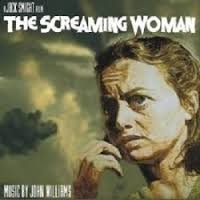
THE SCREAMING WOMAN
US, 1972, 73 minutes, Colour.
Olivia de Havilland, Ed Nelson, Lorraine Stephens, Joseph Cotten, Walter Pidgeon, Alexandra Hay, Charles Drake, Lonnie Chapman.
Directed by Jack Smight.
The Screaming Woman is based on a story by science fiction writer Ray Bradbury (Fahrenheit 451). Olivia de Havilland had starred in the horror pastiche, Hush Hush Sweet Charlotte, and was the star of Lady in a Cage. Here she portrays a woman who is released from a mental institution to the care of her son and his wife. In the grounds, she thinks she hears the screams of a woman buried. This is a variation on the boy who cried wolf as the police are not prone to accept her claims.
Olivia de Havilland is very good in the central role. Ed Nelson is sinister. There is a cast of veterans in support.
The film was directed by Jack Smight, a director of many feature films including Harper, The Illustrated Man, No Way to Treat a Lady.
1. Was this an effective thriller? Why?
2. Was it too sensational or was it realisttc? Why?
3. How did it createl its atmosphere of horror? Our sympathy for the behaviour of the screaming woman?
4. What impression did she make in herself? How mad did she seem? How sensitive was she? The effect of being so rich? Old? Her sympathy towards the buried woman, and her concern? The frustration of that concern? The impact of the people she asked - she seemed to be crying wolf? Her attitude of defeat when she was sedated etc.? How strong was her will and the fact that she restored a woman to life? Her satisfaction with this?
5. The dramatic impact of her begging people to help her and the emotional response to this? David, David's father and his refusal to listen; the couple who did not want to be involved, the agent who had harmed her family and his laughing at her; the murderer himself?
6. What was your response to the son-in-law and his wanting to commit his mother? The attitude of his wife and her selfishness, taunts ? Her being thwarted?
7. Was the murderer too unsympathetic? Was his crime realistic? His relationship with his wife and his girlfriend? The dramatic impact of her arrival?
8. Comment on the style of filming. As a telemovie?
9. The importance of having stars in the leading roles? The guest spots of Walter Pidgeon and Joseph Cotton?
10. What values did the film explore? Attitudes towards life and society? Loneliness and restoring people to life?
Published in Movie Reviews
Published in
Movie Reviews
Tagged under
Saturday, 18 September 2021 19:43
Scream and Scream Again
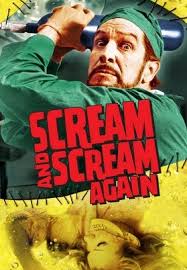
SCREAM AND SCREAM AGAIN
UK, 1970, 95 minutes, Colour.
Vincent Price, Christopher Lee, Peter Cushing, Alfred Marks, Judy Huxtable.
Directed by Gordon Hessler.
The Main Reason for seeing this film about a serial killer, draining his victims for blood, set in London, is the teaming of Vincent Price, Christopher Lee and Peter Cushing.
Vincent Price portrays an eccentric scientist who takes in the serial killer. He is involved in experimentations on making superhuman creatures. Christopher Lee and Peter Cushing are not in the film for much of the running time, Cushing being some kind of neo-Nazi. The main focus is on Alfred Marks as the policeman in charge of the investigation. The film and the stars suggest horror. Rather, this is an action melodrama. Director Gordon Hessler made such horror thrillers as The Oblong Box, The Cry of the Banshee and Scream Pretty Peggy.
1. The emphasis and tone of the title, exploitive? Expectations and fulfilment?
2. The British horror conventions and their use here? The use of prominent British and American horror stars? Giving a tone to the film, expectations?
3. The film considered as a police thriller, success, enjoyment and the interest? The police characters, situations, investigations and dangers?
4. The film considered as a political thriller? Fascist overtones, totalitarianism? The drab uniforms and manoeuvres of the political people, political assassinations? Especially that of Major Reinrich? The various situations within the totalitarian country, the influence of England, the race of supermen?
5. The film considered as a modern horror thriller, Dr. Browning as a benevolent Dr. Frankenstoin? The Frankenstoin monster and the supermen? Dr. Browning, his assistants, the victims within those situations?
6. How well did those various ingredients blend, the predominant effects, the predominant response, interest, comparisons of values?
7. The credit sequence and the runner, a strange beginning, the horror of the logo disappearing? The dance and the girls as being victims, other victims?
8. Dr. Browning as portrayed by Vincent Price? His suave sinister nature, his politeness, his experiments, assistants, the acid bath? His being involved in the making of the supermen, his motivation? The inevitability of his death? An interesting science fiction horror character?
9. The importance of the medical backgroundt hospitals, laboratories? An authentic atmosphere for these goings-on?
10. The importance of the introduction of Keith at the dance, the fascination for the girls, his going off, killing with sexual overtones? His being pursued by the police, his wrenching off his wrist, the death?
11. How interesting was the superman concept? For totalitarian purposes, sciance fiction overtones? The control that the humans wanted?
12. Christopher Lee as Fremont? Public Service, polite and suave, yet sinister, his involvement politically, in the police?
13. The police, the Inspector and his investigations, Sorel and his further involvement and investigations, the danger, his being rescued by Fremont but the irony of what was to happen?
14. Expectations of horror style, gore and deaths? Appropriate for this kind of film?
Published in Movie Reviews
Published in
Movie Reviews
Tagged under
Saturday, 18 September 2021 19:43
Scott of the Antarctic
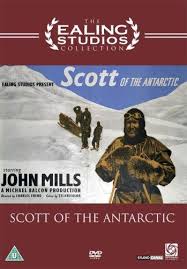
SCOTT OF THE ANTARCTIC
UK, 1948, 111 minutes, Colour.
John Mills, Harold Warrender, James Robertson Justice, Derek Bond, Diana Churchill, Anne Firth, Kenneth More, John Gregson.
Directed by Charles Frend.
Scott of the Antarctic is a straightforward re-creation of the expedition to the Antarctic by Captain Robert Scott. The ill-fated journey is recreated, the finding of Amundsen already at the pole, the return, the inability to arrive, the deaths in the snow – especially Evans and Oates and their deaths. The film has a fine British cast. It recreates the atmosphere of exploration in Antarctica. It takes the style of the still British upper lip and heroism. The film was directed by Charles Frend who worked at Ealing Studios, directing the more serious films like San Demetrio London and The Cruel Sea.
1. Interesting and enjoyable a piece of cinema history?
2. The importance of the visualizing of history? Human achievement? The reality of the past? The history of Britain and its achievement? How patriotic in tone was the film?
3. The film is one of exploration and adventure, the nature of hardships and endurance, themes of survival, winning and achievement? How valuable ah an exploration of these themes?
4. The film seen as a tribute to heroism, achievement, the human spirit and endurance? How obvious was this tone of the film?
5. The importance of the visual aspects of Antarctica for atmosphere, the use of colour, Antarctic beauty and harshness? An environment for survival and achievement, for failure? The environment controlling the men? The background music sustaining this theme?
6. What was the spirit of Captain Scott? The structure of the explanation of his exploration, what motivated him, what drove him?
7. The details of preparation, the visit to Wilson and persuading him to join, the scientific outlook of the expedition, the human side and the wife's decision? The details of Scott's appeal and the need for money? The girl offering the school's money for the dog? The talks in the industrial town? The scoffers? Government grants? Meeting Oates and accepting him and the windfall of money? Taking Bowers with the coincidence of the financial grant? The training sequences in Scandinavia? The irony of Amundsen’s advice about the dogs? The sense of preparation and an important expedition?
8. The pathos of the New Zealand farewell? The irony of Amundsen's telegram? The changed aspect for Scott?
9. The arrival in Antarctica, the plans, the sense of achievement? The men involved in the expedition and their morale? The presentation of the terrain, the physical exertion, the psychological pressures? A convincing experience of the expedition?
10. The inevitability of things going wrong? The unexpected? Terrain and weather? Psychological pressures?
11. How crucial was the choice for the final five to go to the Pole? The Christmas Day celebration and the men’s good spirit?
12. The disappointment for those who did not go to the Pole? The disappointment to find Amundsen there first? The visualizing of this with the flag in the distance? The ironic letter for the King of Norway? The photograph at the Pole? The impact on the men?
13. How difficult wan the return journey? The irregularity of the seasons? Physical health? The continued walking, easing of burdens?
14. The dramatic impact of Evan’s death? The nature of physical and mental exhaustion, even for a big man? The reaction of the others?
15. Oates finding it difficult? His cultivated good cheer? His achievement with the ponies in the south? The rights and wrongs of his decision to go out and die? The decision for the others to let him go? As a figure who gave his life for others?
16. The final sadness with the writing of the diary, the failure of the oil, Bowers remembering his mother, Wilson his wife? The pathos of eleven miles to go?
17. What did the Scott expedition achieve in terms of the human spirit and the value of living? The film as a fitting tribute?
Published in Movie Reviews
Published in
Movie Reviews
Tagged under
Saturday, 18 September 2021 19:43
Scobie Malone

SCOBIE MALONE
Australia, 1975, 98 minutes, Colour.
Jack Thompson, Judy Morris, Shane Porteous, Jacqueline Kott, James Condon, Cul Cullen, Noel Ferrier, Max Meldrum.
Directed by Terry Ohlsson.
Scobie Malone is the detective created by Jon Cleary. For over forty years Scobie Malone had a series of very popular novels – which means that it is a great disappointment that Jack Thompson didn’t continue in the central role and that more films have not been made of Cleary’s novels.
The film is set in Sydney, capitalises on the scenery of the city, especially the comparatively new opera house. The murder mystery involves a callgirl, politicians.
Scobie Malone had made an appearance in the 1968 film The High Commissioner with Rod Taylor in the central role – a pity that he didn’t continue in that role as well.
An interesting variation on the detective film, Australian style. Another attempt at this kind of film was made with Chris Thomson’s The Empty Beach in 1985 with Bryan Brown as Peter Corriss’s Cliff Hardy but that did not materialise as a series either. In 2004 David Wenham appeared as Shane Moloney’s Murray Whelan. This was followed up by The Brush-Off?.
1. This film as an example of the detective genre? A good mystery film or not?
2. The conventions of the detective film, especially from the American police and private eye films? How closely did this film follow these patterns? How distinctive was the Australian flavour in the characterization of the detective, the police and their attitudes, police work?
3. The use of Sydney, the locations, especially the Opera House? How credible was the plot as set in Sydney, the issues, especially crime and drugs, as situated in Sydney?
4. The dramatic effect of the structure: the revelation of the death, the flashbacks and their style, the growth in understanding of Helga, the suspense and the build-up to her murder? How involved did the audience become and why?
5. Scobie Malone as a man: his image, Australian, the swinging style, the non-moral stances, the emphasis on masculinity? His being pictured at his flat, at the motel, the girls around him? Strengths and weaknesses of character, his skills? Audience interest in him, empathy? His decision to accept the sixty days at the end? A kind of copout at the end?
6. How interesting was the character of Helga? How credible a prostitute in Sydney high society? As a character? Audience sympathy? Her clothes. her various means of blackmailing them? The implications of her connections for the important clients and their public name? Her record of her clients etc.? The danger and violence inherent in her way of life?
7. How credible was Mr Sin, his power and wealth, his influence, henchman, their violence, drugs? How satirical was this presentation of Mr Sin?
8. The presentation of Helga’s other clients, as suspects for her murder? The implications of these characters?
9. The focus on the government minister, his character, relationship with Helga, relationship with his wife? Scobie Malone's interviews with them, especially with the wife? The political overtones and scandal?
10. The character of Mr. Sin's henchman, his madness, as a suspect? The build-up to the actual murder?
11. How cynical was the ending in Malone's suspension, the political silence?
Published in Movie Reviews
Published in
Movie Reviews
Tagged under
Saturday, 18 September 2021 19:43
School Waltz, The/ Shkolnyy Vals
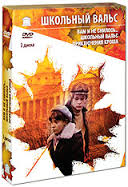
THE SCHOOL WALTZ (SHKOLNYY VALS)
USSR, 1978, 96 minutes, Colour.
Directed by Pavel Liubimov.
Also called Commencement. It would be fairly conventional material if the film came from the United States. However, the film is from the Soviet Union and portrays school-age adolescents in their final year and in the year after school. The similarities with adolescents all over the world are very evident. However, while the production is attractive and colourful, the material is fairly conventional and rendered somewhat implausible by gaps in the screen play. Of interest an an expression of attitudes from Russia in the late seventies.
1. The quality of Russian production, style? The film for a Russian audience, international audience?
2. Colour photography, wide screen, the presentation of Moscow, the city, locations etc.? The score?
3. The structure of the film: one year In the life of the adolescents, the home movies at start and finish? The identification with the main characters and their experiences over one year, the changes in their lives?
4. The picture of school, study, the attention to detail in the way of life at school? The students and their hopes, ambitions?
5. Zonya - as heroine, an attractive girl, her role in the school, her love for Gosha? The wariness of Dina? The outings with Gosha, the night spent with him, her pregnancy? Life at home, the reaction of her parents? Her leaving home, working? Friends with girls at work? Her keeping out of Gosha’s way after their breaking up? Her ability to cope? The birth, trying to got her parents to re-unite? Gosha’s ignorance of the baby? Her visit to the school and the watching of the films? Her love for Gosha? What future?
6. Gosha an hero? An attractive young man? His ambitions, the significance of the volcano through the credits? His type? Attraction to Zonya? The superficiality of their relationship, his spending the night, losing interest in her? The coldness and his drifting apart? His falling a prey to Dina? His behaviour at the dance? His ignorance of the pregnancy? His going through the marriage ceremony, his School Waltz unhappiness, the break-up of the marriage, the encounter with Zonya? How sympathetic was the screenplay towards him and his behaviour?
7. Dina an an attractive girl, type? Her pursuit of Gosha, her attitudes towards Zonya? Her arranging of the dinner and her rudeness to Zonya? Her trying to get Gosha for herself? The dance? The marriage and the happiness but wariness? Her unhappiness at home? Her realizing what had happened?
8. Zonya’s parents and the attention to detail - her mother on the phone, father watching television, the break-up? Their relationships and liaisons? Coming together for the birth of the child? The possibility of reconciliation or not?
9. The contrast with Dina’s parents and the military background, entertaining at home? The long marriage sequence and the build-up? The presentation of Dina’s parents?
10. The portrait of the friends at school, after school, outings otc.?
11. The set scenes and their effect, the opening sequences at school? Dina’s meal? The dance? The swimming outing? The sport sequences? The marriage sequence?
12. The finale and the reunion of the young people. their watching the film? The ironies of seeing them a year earlier especially Zonya?
13. What basic human values and attitudes did the film endorse? Communicate?
Published in Movie Reviews
Published in
Movie Reviews
Tagged under